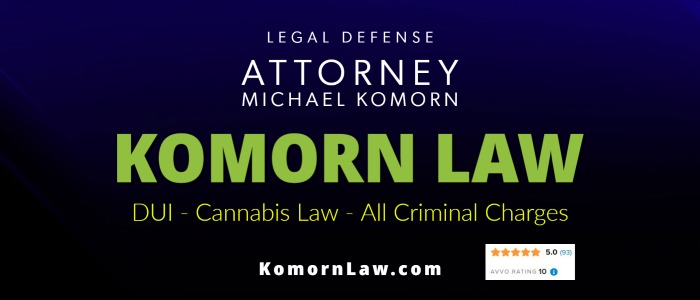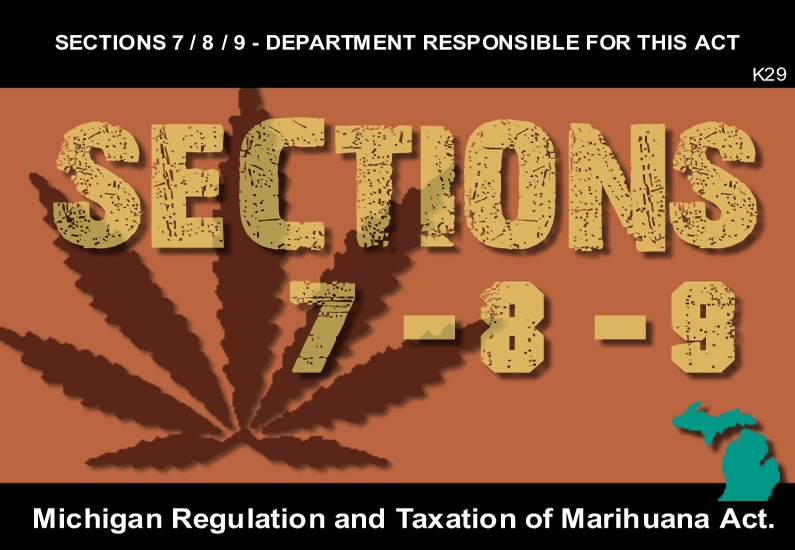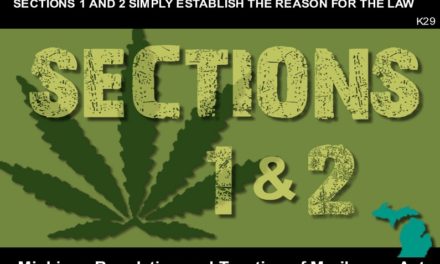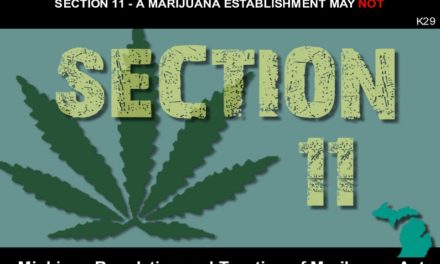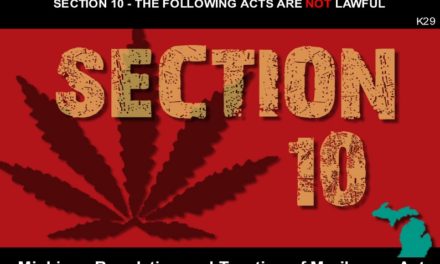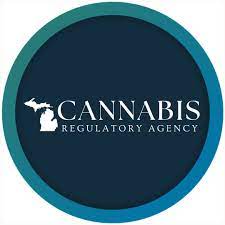SectionS 7 – 8 – 9
This act shall be known and may be cited as the Michigan Regulation and Taxation of Marihuana Act.
MICHIGAN REGULATION AND TAXATION OF MARIHUANA ACT (EXCERPT)
Initiated Law 1 of 2018
333.27957 Implementation, administration, and enforcement by department; powers; duties; public meetings; annual report.
Sec. 7.
1. The department is responsible for implementing this act and has the powers and duties necessary to control the commercial production and distribution of marihuana. The department shall employ personnel and may contract with advisors and consultants as necessary to adequately perform its duties. No person who is pecuniarily interested, directly or indirectly, in any marihuana establishment may be an employee, advisor, or consultant involved in the implementation, administration, or enforcement of this act. An employee, advisor, or consultant of the department may not be personally liable for any action at law for damages sustained by a person because of an action performed or done in the performance of their duties in the implementation, administration, or enforcement of this act. The department of state police shall cooperate and assist the department in conducting background investigations of applicants. Responsibilities of the department include:
(a) promulgating rules pursuant to section 8 of this act that are necessary to implement, administer, and enforce this act;
(b) granting or denying each application for licensure and investigating each applicant to determine eligibility for licensure, including conducting a background investigation on each person holding an ownership interest in the applicant;
(c) ensuring compliance with this act and the rules promulgated thereunder by marihuana establishments by performing investigations of compliance and regular inspections of marihuana establishments and by taking appropriate disciplinary action against a licensee, including prescribing civil fines for violations of this act or rules and suspending, restricting, or revoking a state license;
(d) holding at least 4 public meetings each calendar year for the purpose of hearing complaints and receiving the views of the public with respect to administration of this act;
(e) collecting fees for licensure and fines for violations of this act or rules promulgated thereunder, depositing all fees collected in the marihuana regulation fund established by section 14 of this act, and remitting all fines collected to be deposited in the general fund; and
(f) submitting an annual report to the governor covering the previous year, which report shall include the number of state licenses of each class issued, demographic information on licensees, a description of enforcement and disciplinary actions taken against licensees, and a statement of revenues and expenses of the department related to the implementation, administration, and enforcement of this act.
THINKING OF STARTING A CANNABIS BUSINESS?
Contact Komorn Law 800-656-3557
HAVE THE MOST EXPERIENCED CANNABIS COMMUNITY LAW FIRM ON YOUR TEAM
333.27958 Rules; limitations.
Sec. 8.
1. The department shall promulgate rules to implement and administer this act pursuant to the administrative procedures act of 1969, 1969 PA 306, MCL 24.201 to MCL 24.328, including:
(a) procedures for issuing a state license pursuant to section 9 of this act and for renewing, suspending, and revoking a state license;
(b) a schedule of fees in amounts not more than necessary to pay for implementation, administration, and enforcement costs of this act and that relate to the size of each licensee or the volume of business conducted by the licensee;
(c) qualifications for licensure that are directly and demonstrably related to the operation of a marihuana establishment, provided that a prior conviction solely for a marihuana-related offense does not disqualify an individual or otherwise affect eligibility for licensure, unless the offense involved distribution of a controlled substance to a minor;
(d) requirements and standards for safe cultivation, processing, and distribution of marihuana by marihuana establishments, including health standards to ensure the safe preparation of marihuana-infused products and prohibitions on pesticides that are not safe for use on marihuana;
(e) testing, packaging, and labeling standards, procedures, and requirements for marihuana, including a maximum tetrahydrocannabinol level for marihuana-infused products, a requirement that a representative sample of marihuana be tested by a marihuana safety compliance facility, and a requirement that the amount of marihuana or marihuana concentrate contained within a marihuana-infused product be specified on the product label;
(f) security requirements, including lighting, physical security, and alarm requirements, and requirements for securely transporting marihuana between marihuana establishments, provided that such requirements do not prohibit cultivation of marihuana outdoors or in greenhouses;
(g) record keeping requirements for marihuana establishments and monitoring requirements to track the transfer of marihuana by licensees;
(h) requirements for the operation of marihuana secure transporters to ensure that all marihuana establishments are properly serviced;
(i) reasonable restrictions on advertising, marketing, and display of marihuana and marihuana establishments;
(j) a plan to promote and encourage participation in the marihuana industry by people from communities that have been disproportionately impacted by marihuana prohibition and enforcement and to positively impact those communities; and
(k) penalties for failure to comply with any rule promulgated pursuant to this section or for any violation of this act by a licensee, including civil fines and suspension, revocation, or restriction of a state license.
2. In furtherance of the intent of this act, the department may promulgate rules to:
(a) provide for the issuance of additional types or classes of state licenses to operate marihuana-related businesses, including licenses that authorize only limited cultivation, processing, transportation, delivery, storage, sale, or purchase of marihuana, licenses that authorize the consumption of marihuana within designated areas, licenses that authorize the consumption of marihuana at special events in limited areas and for a limited time, licenses that authorize cultivation for purposes of propagation, and licenses intended to facilitate scientific research or education; or
(b) regulate the cultivation, processing, distribution, and sale of industrial hemp.
3. The department may not promulgate a rule that:
(a) establishes a limit on the number of any type of state licenses that may be granted;
(b) requires a customer to provide a marihuana retailer with identifying information other than identification to determine the customer’s age or requires the marihuana retailer to acquire or record personal information about customers other than information typically required in a retail transaction;
(c) prohibits a marihuana establishment from operating at a shared location of a marihuana facility operating pursuant to the medical marihuana facilities licensing act, 2016 PA 281, MCL 333.27101 to 333.27801, or prohibits a marihuana grower, marihuana processor, or marihuana retailer from operating within a single facility; or
(d) is unreasonably impracticable.
Lost Your License Because You Are A Medical Marijuana Patient?
Contact Komorn Law Immediately to secure your rights… 800-656-3557.
333.27959 License to operate a marihuana establishment; application; qualifications; issuance; disclosure.
Sec. 9.
1. Each application for a state license must be submitted to the department. Upon receipt of a complete application and application fee, the department shall forward a copy of the application to the municipality in which the marihuana establishment is to be located, determine whether the applicant and the premises qualify for the state license and comply with this act, and issue the appropriate state license or send the applicant a notice of rejection setting forth specific reasons why the department did not approve the state license application within 90 days.
2. The department shall issue the following state license types: marihuana retailer; marihuana safety compliance facility; marihuana secure transporter; marihuana processor; marihuana microbusiness; class A marihuana grower authorizing cultivation of not more than 100 marihuana plants; class B marihuana grower authorizing cultivation of not more than 500 marihuana plants; and class C marihuana grower authorizing cultivation of not more than 2,000 marihuana plants.
3. Except as otherwise provided in this section, the department shall approve a state license application and issue a state license if:
(a) the applicant has submitted an application in compliance with the rules promulgated by the department, is in compliance with this act and the rules, and has paid the required fee;
(b) the municipality in which the proposed marihuana establishment will be located does not notify the department that the proposed marihuana establishment is not in compliance with an ordinance consistent with section 6 of this act and in effect at the time of application;
(c) the property where the proposed marihuana establishment is to be located is not within an area zoned exclusively for residential use and is not within 1,000 feet of a pre-existing public or private school providing education in kindergarten or any of grades 1 through 12, unless a municipality adopts an ordinance that reduces this distance requirement;
(d) no person who holds an ownership interest in the marihuana establishment applicant:
(1) will hold an ownership interest in both a marihuana safety compliance facility or in a marihuana secure transporter and in a marihuana grower, a marihuana processor, a marihuana retailer, or a marihuana microbusiness;
(2) will hold an ownership interest in both a marihuana microbusiness and in a marihuana grower, a marihuana processor, a marihuana retailer, a marihuana safety compliance facility, or a marihuana secure transporter; and
(3) will hold an ownership interest in more than 5 marihuana growers or in more than 1 marihuana microbusiness, except that the department may approve a license application from a person who holds an ownership interest in more than 5 marihuana growers or more than 1 marihuana microbusiness if, after January 1, 2023, the department promulgates a rule authorizing an individual to hold an ownership interest in more than 5 marihuana growers or in more than 1 marihuana microbusiness.
4. If a municipality limits the number of marihuana establishments that may be licensed in the municipality pursuant to section 6 of this act and that limit prevents the department from issuing a state license to all applicants who meet the requirements of subsection 3 of this section, the municipality shall decide among competing applications by a competitive process intended to select applicants who are best suited to operate in compliance with this act within the municipality.
5. All state licenses are effective for 1 year, unless the department issues the state license for a longer term. A state license is renewed upon receipt of a complete renewal application and a renewal fee from any marihuana establishment in good standing.
6. The department shall begin accepting applications for marihuana establishments within 12 months after the effective date of this act. Except as otherwise provided in this section, for 24 months after the department begins to receive applications for marihuana establishments, the department may only accept applications for licensure: for a class A marihuana grower or for a marihuana microbusiness, from persons who are residents of Michigan; for a marihuana retailer, marihuana processor, class B marihuana grower, class C marihuana grower, or a marihuana secure transporter, from persons holding a state operating license pursuant to the medical marihuana facilities licensing act, 2016 PA 281, MCL 333.27101 to 333.27801; and for a marihuana safety compliance facility, from any applicant. One year after the department begins to accept applications pursuant to this section, the department shall begin accepting applications from any applicant if the department determines that additional state licenses are necessary to minimize the illegal market for marihuana in this state, to efficiently meet the demand for marihuana, or to provide for reasonable access to marihuana in rural areas.
7. Information obtained from an applicant related to licensure under this act is exempt from disclosure under the freedom of information act, 1976 PA 442, MCL 15.231 to 15.246.
History: 2018, Initiated Law 1, Eff. Dec. 6, 2018.
Compiler’s Notes: This new act was proposed by initiative petition pursuant to Const. 1963, art 2, section 9. The proposed language was certified to the legislature on April 26, 2018 with the 40-day consideration period lapsing on June 5, 2018. The initiative petition was submitted to the voters as proposal 18-1 at the November 6, 2018 general election where it was approved 2,356,422 for and 1,859,675 against.
© 2017 Legislative Council, State of Michigan
Regulations and Laws may be updated without notice or changes on this page. Please check here for current laws and any updates. http://legislature.mi.gov/doc.aspx?mcl-Initiated-Law-1-of-2018

